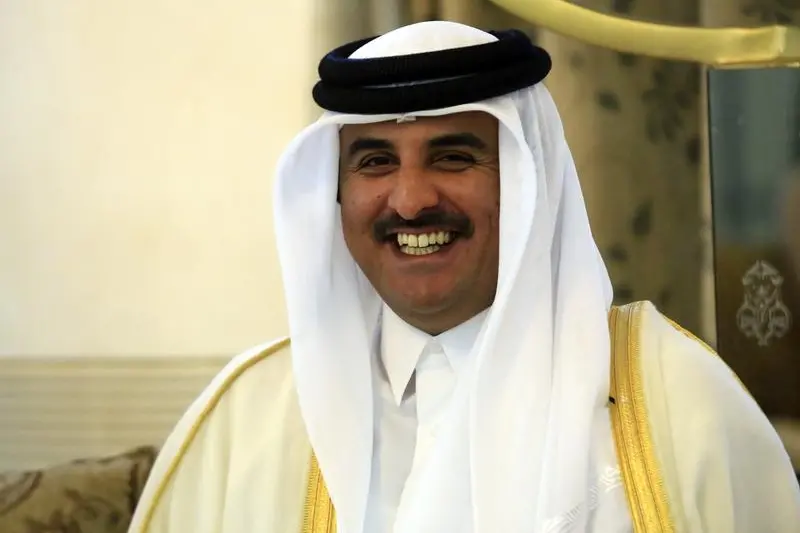PHOTO
Wednesday, May 31, 2017
It is time for Qatar to stop equivocating and make clear that it supports the joint positions of the Gulf Cooperation Council (GCC), that were outlined at the recent summits when United States President Donald Trump visited Saudi Arabia. During those momentous days of the US president’s first official foreign visit, all six nations of the Gulf made clear that they regard Iran as a serious problem for regional stability, and that terrorism is a phenomenon that has to be exterminated. It was very encouraging that during both the America-GCC and the America-Muslim summits, King Salman Bin Abdul Aziz of Saudi Arabia and Trump united with the other attending the events to attack Iran for its flagrant interference in its neighbours’ internal affairs, and to condemn terrorism and the cancer of extremism.
So it was a serious crisis when, within a week, Qatar News Agency (QNA) reported statements from its leadership that Qatar had reneged on its commitments and criticised such efforts to isolate Iran. After the inevitable outcry about the content of this bizarre speech, QNA claimed that it had been hacked, and it removed the statements that purported to come from the Emir himself. But it is very damaging that there has been no formal denial of these inflammatory statements that have been left to hang in the air, resonating dangerously in the official silence that Qatar has chosen to adopt on the issue.
It is a tragedy that the GCC’s unified position against Iran’s support for sectarian violence and terror has been shattered by a GCC state having second thoughts. The threat of violent extremism has to be fought by all GCC nations. It is not something that can be accommodated or treated as a normal political movement. The huge dangers of this disastrous confusion, and the embarrassment of having it happen after such a public re-affirmation of unity, has forced the other GCC states to take action in order to get Qatar to realise the dangers that it will unleash through its acquiescence to the Muslim Brotherhood, and its recognition of Iran as a peaceful neighbouring state.
Qatar’s refusal to deny these important points, or to clarify its position has forced other GCC states, including the UAE, to speak out bluntly. Dr Anwar Gargash, Minister of State for Foreign Affairs, said that “The right path is through openness, credibility and confidence. In a turbulent region, there is no alternative to Gulf unity, and Saudi Arabia is the lynchpin”.
‘Grave danger’
Gargash went so far as to say that the GCC is going through a “severe crisis” and that the dispute poses a “grave danger” to the members of the GCC. “Fending off strife needs a change in behaviour, building confidence and restoring credibility.” Qatar needs to return to terms of the GCC’s 2014 Riyadh Declaration that agreed that GCC states should respect each other, and isolate Iran till it changed its ways.
In the last few days, Qatar has broken these mutual understandings and has apparently chosen to describe Iran as an important neighbour with whom it would be better to have good relations, it said. This coincides with the re-election of Iranian President Hassan Rouhani, whom the international media often mistakenly calls “liberal”. Nothing could be more wrong. Rouhani is a deeply conservative politician dedicated to Iran’s Islamic revolution, but rather than being an isolationist, like his predecessor Mahmoud Ahmadinejad, Rouhani is an internationalist. He wants to encourage foreign investment in Iran, but without forsaking any of the dangerous ideology that is at the heart of Iran’s current constitution, requiring the republic to export its revolution.
An example of the dangerous falsehoods emanating from the Rouhani government was his statement after he was elected. He said that “we want the world of Islam, which is suffering from divisions, to advance towards peace and brotherhood, and to this effect we are ready to negotiate to get a real agreement”.
Tell that to the desperate millions of refugees in Syria who have seen the Iranian-backed Hezbollah and the Iranian Quds force rescue Syrian President Bashar Al Assad’s regime from near-certain failure and prolong the civil war for years to Iran’s great advantage. Tell that to the mothers in north Yemen whose families are suffering from a totally preventable epidemic of cholera — thanks to the total collapse of health services and utilities as the Iranian-backed Al Houthis refuse to come to the negotiating table and end the war.
Far better to listen to Rouhani’s boss, Iran’s Supreme Leader Ali Khamanei, who was far more truthful when he threatened Saudi Arabia on his website, saying that “Appearances should not fool anyone. They are on their way out. There is no question about that.” At least Khamanei tells it like it is, and makes clear that the current regime in Tehran harbours deep ill-will towards its neighbours, and is actively promoting this malignant ideology.
This is why it is so dangerous for Qatar to break away from the agreed GCC position of seeking to restrain Iran’s activities, and this is why Qatar needs to make clear that it still agrees to the common position outlined at the summit with the US president.
By Francis Matthew | Editor at Large
Gulf News 2017. All rights reserved.





















